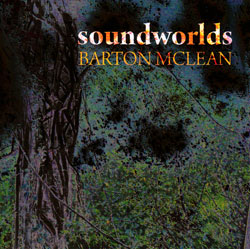
Admittedly, the album's title and those of the individual compositions put me off from the start. The music is better than that though still suffering from a conception relatively undifferentiated from composers in the lineage of Lou Harrison down through Daniel Lentz.
"Concerto: States of Being", for piano (Barton) and the Petersburgh Electrophilharmonia (of which no further description is provided), is quite Harrison-esque, the piano nodding obliquely to gamelan, offset by the kind of squiggly synth tones you really wish had expired by the mid-70s. It's pretty enough, the bell-tones are attractive in a faux-Asian manner, but it meanders without much form or drive and not a scintilla of grit. Harrison's work evoked the real world, even if it was, to Westerners, exotically distant. This evokes academe.
"Ritual of the Dawn" (I'm really trying not to comment of the titles...) for a quintet of flutes, clarinet, harp, piano and percussion seems to be less referential and ambles along pleasantly, a strolling rhythmic figure in the piano helping to keep the bird-like fluttering of flute and clarinet from straying too far afield. It drifts into effectively dreamy territory towards its conclusion. In all, nothing startling, but well put together and capable of sustaining interest. A piece for tape, "Demons of the Night" (I'm biting my lip), follows, deploying a wide range of almost unerringly tepid sounds, all sanded down and squelchy, very typical of academic electronics, a world that seems to have never heard of David Tudor, much less more recent work in that lineage. Here, Barton is presumably attempting to summon forth owls, mosquitoes, coyotes and other denizens of the dark but succeeds in merely limning jellified versions of same. "Magic at Xanadu" (Yes! That's right: "Magic at Xanadu") is, in fact, somewhat better than its title, a live interactive electronics performance by McLean that moves in stately, not to say prissy, fashion, perhaps nodding to Near East traditions alongside booming, horn-like elements that impart a processional feel. "Ice Canyons", similarly performed is more delicate and, yes, chillier. Here, Barton largely succeeds in his programmatic aim of musically depicting ice shards, glaciers and the like. Again, nothing particularly arresting, more like a soundtrack to an NPR report....
The disc closes with "Rainforest Images II" (no, no trace of Tudor to be found), for electronics, winds, violin and voices as well as recorded bird sounds from the Peruvian Amazon and Australian rainforests. It spends its 20 minutes doing what, by now, we've come to expect: establishing a gently percolating bed of electronics through and above which natural sounds mingle with spacey sung or generated ones, the voices attempting to convey oneness with nature and not coming close. One peers in vain for a glimpse bamboo reeds with poisoned darts peeking through the foliage...
Comments and Feedback:



More Recent Reviews, Articles, and Interviews @ The Squid's Ear...


|

